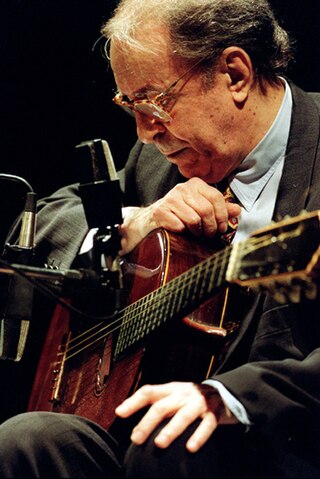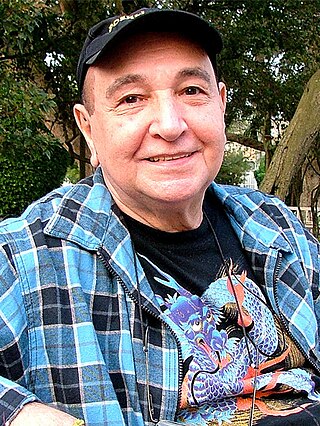Related Research Articles

Caetano Emanuel Viana Teles Veloso is a Brazilian composer, singer, guitarist, writer, and political activist. Veloso first became known for his participation in the Brazilian musical movement Tropicália, which encompassed theatre, poetry and music in the 1960s, at the beginning of the Brazilian military dictatorship that took power in 1964. He has remained a constant creative influence and best-selling performing artist and composer ever since. Veloso has won nine Latin Grammy Awards and two Grammy Awards. On 14 November, 2012, Veloso was honored as the Latin Recording Academy Person of the Year.

Bossa nova is a relaxed style of samba developed in the late 1950s and early 1960s in Rio de Janeiro, Brazil. It is mainly characterized by a calm syncopated rhythm with chords and fingerstyle mimicking the beat of a samba groove, as if it was a simplification and stylization on the guitar of the rhythm produced by a samba school band. Another defining characteristic of the style is the use of unconventional chords in some cases with complex progressions and "ambiguous" harmonies. A common misconception is that these complex chords and harmonies were derived from jazz, but samba guitar players have been using similar arrangement structures since the early 1920s, indicating a case of parallel evolution of styles rather than a simple transference from jazz to bossa nova. Nevertheless bossa nova was influenced by jazz, both in the harmonies used and also by the instrumentation of songs, today many bossa nova songs are considered jazz standards. The increase in popularity of bossa nova has helped to renew samba and contributed to the modernization of Brazilian music in general.

Francisco Buarque de Hollanda, popularly known simply as Chico Buarque, is a Brazilian singer-songwriter, guitarist, composer, playwright, writer, and poet. He is best known for his music, which often includes social, economic, and cultural reflections on Brazil.

João Gilberto was a Brazilian guitarist, singer, and composer who was a pioneer of the musical genre of bossa nova in the late 1950s. Around the world, he was often called the "father of bossa nova"; in his native Brazil, he was referred to as "O Mito" . In 1965, the album Getz/Gilberto was the first jazz record to win the Grammy Award for Album of the Year. It also won Best Jazz Instrumental Album – Individual or Group and Best Engineered Album, Non-Classical. Nominated at the Grammy 1978 in the category Best Jazz Vocal Performance, album Amoroso, and winner category in Grammy 2001 with João voz e violão Best World Music Album.

Getz/Gilberto is an album by American saxophonist Stan Getz and Brazilian guitarist João Gilberto, featuring pianist and composer Antônio Carlos Jobim, who also composed many of the tracks. It was released in March 1964 by Verve Records. The album features the vocals of Astrud Gilberto on two tracks, "Garota de Ipanema" and "Corcovado". The artwork was done by artist Olga Albizu. Getz/Gilberto is a jazz and bossa nova album and includes tracks such as "Desafinado", "Corcovado", and "Garota de Ipanema". The last received a Grammy Award for Record of the Year and started Astrud Gilberto's career. "Doralice" and "Para Machucar Meu Coração" strengthened Gilberto's and Jobim's respect for the tradition of pre-bossa nova samba.

Gal Maria da Graça Costa Penna Burgos, known professionally as Gal Costa ( ), was a Brazilian singer of popular music. She was one of the main figures of the tropicalia music scene in Brazil in the late 1960s and appeared on the acclaimed compilation Tropicália: ou Panis et Circencis (1968). She was described by The New York Times as "one of Brazil's greatest singers."

Maria Bethânia Viana Teles Veloso is a Brazilian singer and songwriter. Born in Santo Amaro, Bahia, she started her career in Rio de Janeiro in 1964 with the show "Opinião" ("Opinion"), she is "The Queen of Brazilian Music". Due to its popularity, with performances all over the country, and the popularity of her 1965 single "Carcará", the artist became a star in Brazil.

Arnaldo Antunes is a Brazilian musician, writer, and composer. He was a member of the rock band Titãs, which he co-founded in 1982 and left ten years later. After 1992, he embarked on a solo career. He has published poetry and had his first book published in 1983. He has worked with Marisa Monte, Tribalistas, and Carlinhos Brown.

Elza da Conceição Soares, known professionally as Elza Soares, was a Brazilian samba singer. In 1999, she was named Singer of the Millennium along with Tina Turner by BBC Radio.

Os Mutantes is the debut album by the Brazilian tropicalia band Os Mutantes. It was originally released in 1968 by Polydor and blends traditional Brazilian music styles with American and British psychedelia. The album includes a cover of The Mamas & The Papas' "Once Was a Time I Thought", translated into "Tempo no Tempo", and a cover of "Le premier bonheur du jour", previously recorded by Françoise Hardy. It was reissued in 1999 on Omplatten Records and again in 2006 by Omplatten's parent company, Universal Records.

A Divina Comédia ou Ando Meio Desligado is the third album by the Brazilian rock band Os Mutantes. The album was originally released in 1970 and reissued in 1999 on Omplatten Records and again in 2006 by Omplatten's parent company, Universal Records. The title in English means: The Divine Comedy or I Am a Bit Disconnected. "I am a bit disconnected" in this sense means "I feel a little spaced out." The second track features the band imitating California accents. The album as a whole is characterized by a mix of psychedelic and religious imagery.

Falso Brilhante is a 1976 studio album released by the critically acclaimed Brazilian MPB singer Elis Regina.
Tropicália ou Panis et Circencis is a 1968 collaboration album by artists including Gilberto Gil, Caetano Veloso, Tom Zé, Nara Leão, Os Mutantes and Gal Costa. Considered an important record in the Tropicália movement and in the history of Brazilian music, it features orchestral arrangements by Rogerio Duprat and lyrical contributions from Torquato Neto.

João Donato de Oliveira Neto was a Brazilian jazz and bossa nova pianist as well as a trombonist from Rio Branco. He first worked with Altamiro Carrilho and went on to perform with Antonio Carlos Jobim and Astrud Gilberto. Because of the area he grew up in Brasil he was able to hear Cuban music on the radio. This influence would manifest itself in many of his compositions, piano, and trombone playing. Donato's most well-known compositions include: "Amazonas", "Lugar Comum", "Simples Carinho", "Até Quem Sabe" and "Nasci Para Bailar".
"Wave" is a bossa nova and jazz standard song written by Antônio Carlos Jobim. Recorded as an instrumental on his 1967 album of the same name, its English lyrics were written by Jobim himself later that year.

Construção is the eighth studio album by Brazilian singer-songwriter Chico Buarque, released in December 1971. It was composed in periods between Buarque's exile in Italy and his return to Brazil. Lyrically, the album is loaded with criticisms of the Brazilian military dictatorship, especially with regard to the censorship imposed by the government at the time. It is widely regarded by music critics as one of the greatest Brazilian albums of all time, and its title track was named the greatest Brazilian song of all time by Rolling Stone in 2009.

Acabou Chorare is the second studio album by Brazilian rock and MPB group Novos Baianos. The album was released in 1972 by Som Livre, following the group's moderately successful debut É Ferro na Boneca (1970). During the recording of the album, the group took inspiration from various contemporary artists of the time, such as Jimi Hendrix, João Gilberto, and Assis Valente. In addition, Gilberto heavily influenced the sound of the album, as he served as the group's mentor during the album's recording sessions.
Da Lama ao Caos is the debut album by the Brazilian band Chico Science & Nação Zumbi. Released in 1994, the album presents a fusion of funk rock and maracatu and contributed for spreading the music of Pernambuco around the world. Da Lama ao Caos is considered the manifesto of the Manguebeat movement.

Gilberto Gil (also commonly referred to as Gilberto Gil (Frevo Rasgado) to differentiate it from Gil's other self-titled releases) is the second studio album by Gilberto Gil, originally released in early 1968. The album features a blending of traditional Brazilian styles such as samba and bossa nova with American rock and roll. It also mixes Rogério Duprat's orchestral arrangements with the electric guitars of Brazilian rock group Os Mutantes.

Expresso 2222 is the fifth studio album by Brazilian artist Gilberto Gil, released in June 1972 by Philips Records. In October 2007, the magazine Rolling Stone's Brazilian edition published a list of the 100 Greatest Albums of Brazilian Music, in which Expresso 2222 featured at number 26.
References
- ↑ Os 100 Maiores Discos da Música Brasileira , Rolling Stone Brasil